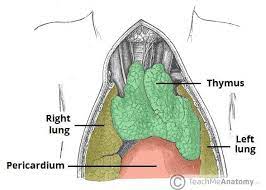Thymus involution refers to the natural process of gradual shrinking and decreased activity of the thymus gland over time. The thymus is a specialized organ located in the upper chest, behind the breastbone, and plays a crucial role in the development and maturation of certain immune cells known as T cells.
During childhood and adolescence, the thymus is actively involved in producing and maturing T cells, which are essential components of the immune system. T cells are responsible for recognizing and targeting foreign invaders like bacteria, viruses, and abnormal cells, including cancer cells. The thymus provides an environment where immature T cells mature and differentiate into functional T cells with specific roles in immune defense.

However, as individuals age, the thymus undergoes a process of involution, which means it gradually becomes smaller in size and loses some of its functional capacity. This involution begins shortly after puberty and continues throughout adulthood. As a result of thymus involution, the production of new T cells diminishes, and the overall diversity of the T cell repertoire decreases.
Thymus involution is a natural part of the aging process and is influenced by various factors, including genetics, hormones, and environmental factors. While the decline in thymic function is a normal aspect of aging, it can have implications for immune health. The reduced output of new T cells can lead to a decreased ability to respond to new or previously unrecognized pathogens, which contributes to the increased susceptibility to infections and certain diseases that is often observed in elderly individuals.

Researchers continue to study thymus involution and its effects on the immune system to better understand how to support immune health in aging populations. Strategies such as maintaining a healthy lifestyle, consuming a balanced diet rich in essential nutrients, and staying physically active can help mitigate some of the effects of thymus involution on immune function.
Mitigating effects of thymus involution using nutrients
Several essential nutrients play crucial roles in supporting immune health, especially as you age. Here are some of the best essential nutrients that can help support your immune system:
- Vitamin C: This antioxidant is known to boost immune function by promoting the production and activity of immune cells. It also aids in wound healing and helps the body absorb iron from plant-based foods. Citrus fruits, berries, bell peppers, broccoli, and spinach are excellent sources of vitamin C.
- Vitamin D: Vitamin D is essential for immune system regulation and helps modulate the immune response. It’s synthesized by the body when exposed to sunlight. Fatty fish (salmon, mackerel), fortified dairy products, and egg yolks are good dietary sources of vitamin D.
- Zinc: Zinc is critical for the development and function of immune cells. It’s involved in various immune processes, including antibody production and inflammation control. Sources of zinc include lean meats, poultry, seafood, nuts, seeds, and whole grains.
- Omega-3 Fatty Acids: These healthy fats have anti-inflammatory properties and can help regulate immune responses. Fatty fish (salmon, sardines), flaxseeds, chia seeds, and walnuts are rich sources of omega-3 fatty acids.
- Protein: Adequate protein intake is essential for the production of antibodies and immune cells. Protein-rich foods like lean meats, poultry, fish, beans, lentils, and dairy products can provide the necessary amino acids for immune support.
- Antioxidants: A variety of antioxidants, such as vitamin E, selenium, and beta-carotene, help protect immune cells from oxidative stress. Nuts, seeds, whole grains, spinach, carrots, and sweet potatoes are good sources of antioxidants.
- Fiber: A healthy gut microbiome is linked to better immune function. High-fiber foods like whole grains, legumes, fruits, and vegetables support gut health by providing nourishment for beneficial gut bacteria.
- Probiotics: These beneficial bacteria help maintain a balanced gut microbiome, which is crucial for immune health. Fermented foods like yogurt, kefir, sauerkraut, and kimchi contain natural probiotics.
- Iron: Iron is necessary for the proper functioning of immune cells and the production of hemoglobin, which carries oxygen to cells. Good sources of iron include lean meats, poultry, fish, beans, lentils, spinach, and fortified cereals.
- Selenium: Selenium is an important antioxidant that helps protect immune cells from damage. Brazil nuts, seafood, whole grains, and eggs are sources of selenium.
Remember that a balanced diet that includes a variety of nutrient-rich foods is key to overall health and immune support. While these nutrients are important, it’s also essential to maintain a healthy lifestyle that includes regular physical activity, stress management, adequate sleep, and hydration to support your immune system as you age. If you have specific health concerns or conditions, it’s advisable to consult with a healthcare professional before making significant dietary changes or taking supplements.